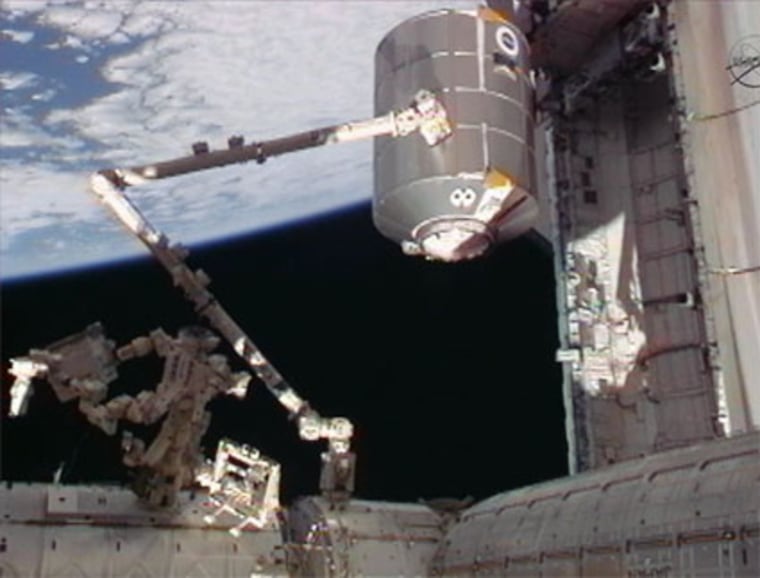The International Space Station got a year's worth of groceries in a giant shopping cart on Monday, courtesy of the astronauts on NASA's final shuttle flight.
Astronauts Sandra Magnus and Douglas Hurley used the space station's hulking robot arm to hoist the bus-size container out of Atlantis' payload bay and attach it to the orbiting outpost.
The canister — 21 feet long and 15 feet across (6.4 meters long, 4.6 meters across) — is jammed with nearly 5 tons of household goods, enough to keep the 245-mile-high (400-kilometer-high) station and its inhabitants going for another year. Food alone accounted for more than a ton. Clothes also were stuffed inside the Italian-built cylinder, named Raffaello, as well as spare parts for the station.
"Take care and let us know if we can do anything from down here," Italian astronaut Paolo Nespoli, a former space station resident, radioed from the European Space Agency's control center in Germany.
"Ciao, buddy," space station astronaut Michael Fossum replied.
Speeding ahead of schedule, the astronauts opened the hatch and entered Raffaello a few hours later; white bags were stacked high on all sides.
First on the unpacking list were so-called crew preference items, said flight director Jerry Jason. The six space station residents already received a bag of fresh fruit — the shuttle astronauts hand-delivered that immediately after Sunday's docking — and were promised extra jars of peanut butter.
Lots of good news
The astronauts got a quadruple dose of good news Monday. Atlantis' crew gets an extra day at the space station; the shuttle is in excellent shape; a piece of space junk is no longer a threat; and a critical computer is running normally after being knocked offline.
"These guys have been outstanding house guests. ... they can stay as long as they want," said space station astronaut Ronald Garan Jr.
The shuttle has only a few spots of extremely minor launch damage, and the astronauts can forgo any further inspections until after next week's undocking, mission managers decided Monday.
"The team has been ... very committed to this idea of finishing strong. It's not just a mantra for us," mission management team chairman LeRoy Cain told reporters.

On Sunday, flight controllers were worried a piece of space junk might pass dangerously close Tuesday, right in the middle of the lone spacewalk planned for the mission. But on Monday, experts said the object — a piece of an old Soviet-era satellite — would remain a safe 11 miles (18 kilometers) away, and the shuttle-station complex would not need to dodge it.
Sunday's docking by Atlantis actually bumped the joined vessels into an out-of-harm's-way orbit.
Space junk is said to be the No. 1 threat facing the space station in the coming decade. More than 500,000 pieces of orbiting debris are being tracked, according to NASA. Two weeks ago, the space station residents had to seek shelter in their lifeboats when a piece of junk came within 1,100 feet (335 meters) — the closest encounter yet.
Atlantis blasted off Friday. The flight, now at 13 days, is due to end July 21; touchdown will close out the 30-year shuttle program.
Unpacking and taking out the trash
All 10 astronauts will spend the next week unloading the contents of Raffaello and filling the chamber back up with packing material, and space station garbage and old equipment.
Flight director Kwatsi Alibaruho said the back-and-forth load work by the astronauts will be like an army of ants moving in and out of their anthill.
NASA wants the space station well-stocked for the looming post-shuttle era. Private companies are working on rockets and spacecraft to deliver cargo, but that's still months away and there's always the chance of delays.
The ultimate goal — in three to five years — is for these same companies to ferry astronauts to and from the space station. Until then, NASA will keep shelling out tens of millions of dollars per seat aboard the Russian Soyuz spacecraft.
The two U.S. space station residents, meanwhile, will venture out on a spacewalk Tuesday. Fossum and Garan will retrieve a broken ammonia pump and stash it aboard Atlantis. Engineers want to figure out why it failed last summer, crippling the space station's cooling system for more than two weeks. The pair also will attach a robotic refueling experiment to the space station.
Four astronauts are flying on Atlantis — the smallest shuttle crew in decades — and six on the space station. They represent the United States, Russia and Japan.
Magnus, the lone woman on board, dug out the striped fuzzy socks she wore during her four-month space station stay more than two years ago. She wiggled her toes in front of the cameras.
"I'd like to announce the return of the socks," she said. "Just a little nostalgia there for a moment."
Atlantis is the last of NASA's three remaining shuttles to be retired, as the space agency turns its focus on expeditions to an asteroid and Mars. It will remain at Kennedy Space Center upon its return and be put on public display.